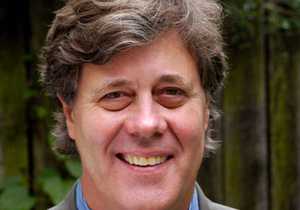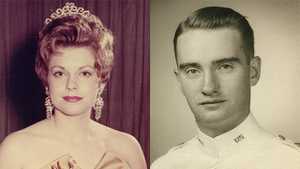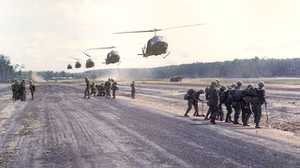Two Days in October tells the story of a harrowing battle in Vietnam in the fall of 1967, and the simultaneous protests that broke out on the campus of the University of Wisconsin Madison. The film offers first-hand accounts from those who were in both places — painting a vivid picture of the wildly divisive war, and the dramatic and often devastating effects it had on everyone from soldiers to students to families.
Below are profiles of many of the people featured in the film.
Jean Ponder Allen
Soldier's wife

"...I have never changed my mind about the wrongness of the war in Vietnam..."
In 1960, Jean Ponder married Terry Allen, Jr., the son of a famous World War II general. She was a Texas beauty queen 14 years younger than her husband. He was a career Army officer, following in his father's footsteps. By 1967, Terry was fighting in Vietnam and Jean was raising three girls herself. She began to question the war -- and her marriage . She sent Terry a Dear John letter, and the couple was soon headed toward divorce. Terry was killed in combat on October 17, 1967.
Michael Arias
Soldier

"We had been told...we were not to mention that this was an ambush."
Michael Arias was delivering laundry detergent and mouthwash door-to-door in Phoenix, Arizona when he was drafted. He wound up in Alpha Company of the Black Lions, as a radiotelephone operator. In the battle of October 17, 1967, Michael Arias led a group of soldiers out of danger with the aid of a compass. In 1996, his daughter married a man whose parents were part of the antiwar movement at the University of Wisconsin in 1967.
Jane Brotman
Student

"...I now felt like I was part of this antiwar movement on campus..."
Jane Brotman enrolled at the University of Wisconsin, Madison in the fall of 1967, one of 124 first-year students from New Jersey. Coming from a conventional family, she viewed the student activist movement as a distraction. After she witnessed the violent clash between campus protesters and Madison police, Brotman began to question the war in Vietnam. In 1997, Brotman's son joined the Madison police force
Jack Cipperly
Assistant Dean

"...the veterans who went into combat out themselves on the line directly, but the students put themseves on the line, too."
Jack Cipperly grew up in Madison, in the residential Westside neighborhood. After serving in the Marine Corps, he enrolled at the University of Wisconsin on the G.I. Bill, working as a construction worker part-time. Cipperly continued at the university for his Masters and Ph.D. degrees. By 1967, he was an assistant dean there.
Joe Costello
Soldier

"...as bad as [Vietnam] was for me - and including the difficult memories that I'll always have - everything's always going to be better than that."
After graduating from high school in Merrick, Long Island, Joe Costello volunteered for the army -- against the wishes of his parents, who wanted him to go to college. By volunteering for the draft, he could get out of the service in two years instead of three. Just eighteen years old in the fall of 1967, he was a grenadier for the Alpha platoon of the Black Lions.
Keith Hackett
Madison policeman

"[Student protestors] split the country...I have a hard time forgiving them."
Keith Hackett grew up in Baraboo, Wisconsin, a farming community 40 miles north of Madison. A Navy Reservist for six years and an Army Reservist for three, he drove trucks after high school. He moved to Madison after seeing a job listing for police officers in the newspaper.
Diane Sikorski Kramer
Soldier's sister

"I know Danny did the right thing...and I know that my son woud do the right thing..."
Diane and Danny Sikorski grew up in the Polish working-class South Side of Milwaukee. Their father worked on the Miller Brewing Company assembly line. Danny played football at Boy's Technical High School and found work at a local tool plant after graduation. He enlisted in the Army upon receiving his draft notice and was soon sent to Vietnam. He wrote his younger sister often. Weeks after learning of Danny's death in combat, Diane received her last letter to him, stamped "Return to Sender/Verified Deceased".
Jim Rowen
Student

"...during the antiwar movement,...people lile me... were completely shut out."
Jim Rowen grew up in the Maryland suburbs of Washington, D.C., the son of a Washington Post writer. He became active in the civil rights movement while at high school and married Susan McGovern, U.S. Senator George McGovern's daughter. The couple enrolled at the University of Wisconsin and became active in the antiwar movement. In the 1970s, Jim Rowen served as the chief of staff to Madison's mayor, fellow U.W. alum and activist Paul Soglin.
Paul Soglin
Student

"...this episode of Dow and then realizing how isolated we were, really reinforced my idea about running for the City Council..."
Paul Soglin grew up in Chicago in a politically active family. His father worked as a teacher without pay for two years, after refusing to sign a loyalty pledge required from state employees. His mother named him in honor of the African American performer and civil rights activist, Paul Robeson. Soglin entered the University of Wisconsin in 1962 and stayed until 1972, when he received his law degree. Soglin served as secretary of the local branch of the Student Nonviolent Coordinating Committee and wrote for the Daily Cardinal, a school newspaper. He became involved in city politics in 1968, first elected alderman for Madison's 8th district and then elected mayor in 1973.
Clark Welch
Commander

"...I stayed in [the Army] to make it better for those few people that I could influence."
Clark Welch grew up in Durham, New Hampshire. He enrolled in the Army out of high school, after a Marine recruiter told him he was too scrawny and an air Force recruiter said he could never be a pilot since he wore glasses. Welch served in the Army Special Forces in South America, Laos and Lebanon, before going to Vietnam, where he commanded the Delta Company division of the Black Lions regiment. He survived the battle of October 17, 1967 with multiple wounds. Decades later, Welch returned to the ambush site in Vietnam, where he met the man who commanded the Viet Cong soldiers against the Black Lions.
Page published 9/22/2005







